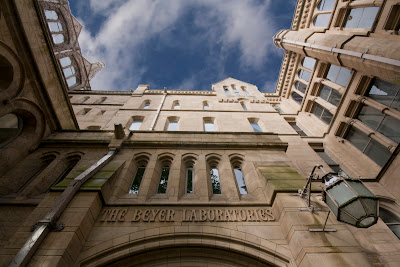Since I have taken photography more seriously and started to learn new skills, I've struggled with this dilemma:
Does post processing destroy the ethos of photography?
Digital post processing can certainly encourage a lazy approach to photography with the power of camera RAW. Certain features of someone’s face are permanent; part of who they are but often airbrushed away. Equally, photographs you wouldn't look twice at in their original format are often transformed by post processing.
Some photographers regard post processing as photographic heresy... I've not made my mind up yet but I find it hard to rule post processing out completely when it can come to the rescue of an image like this:


5 comments:
I thought about this after your tweet to me a while back. My opinion is that because most photos are taken digitally now, if we rule out post-processing as 'cheating' we must also say goodbye to all of the effects and styles that used to be created chemically as these aren't present in original RAW files.
No more black and white, no more sepia, no more cross-processing. Doesn't seem very interesting to me!
If applying an effect or doing retouching improves the image then why settle for the original? It's only the same as dodging/burning/cropping, just much easier and more accessible.
Tom.
Quite agree, but where to draw the line is what really interests me... is it ok to make a model's legs that little bit thinner if it 'improves the image'? What about making the sky a brighter shade of blue, the grass greener... at what point does it all become a bit deceiving? I get the guilts the more filters and layers I get into in Photoshop... but maybe I just need to get over it :)
I think that messing about with filters and layers, doing a little bit of dodge and burn, sharpening etc is just the digital equivalent of spending ages in a dark room with a load of chemicals and a roll of 35mm film. Thats how I justify it to myself anyway =)
If it helps you see in the image what your eye saw in the first place it is always a good thing. That goes for seeing the sky and it also goes for capturing someone's beauty.
Our brain already compensates a million trillion times for what happens in real life. It edits out our blinks, it processes the RAW that our eyes see. Our brains are little bit like Photoshop. (There was a really interesting article in New Scientist about how our brains process what we see a couple of months back).
A person can be beautiful with or without certain flaws... in real animated life our brains edit the flaws out; in a still image it can be more difficult for our minds to filter out the flaws but Photoshop can do the job for us!
That said, I still think there is a limit!!!
Hope that makes sense...
I think if the post-production rescues a photo and is a reproduction of what you saw that needs to be altered to accurately reflect something that human error/mechanical frailty missed then ok. If however the photo is 'improved" just to create a better image e.g. the model's legs, it's a no-no for me. Photos should be about capturing a reality,not recreating the reality we would have liked to see at that time!
Post a Comment